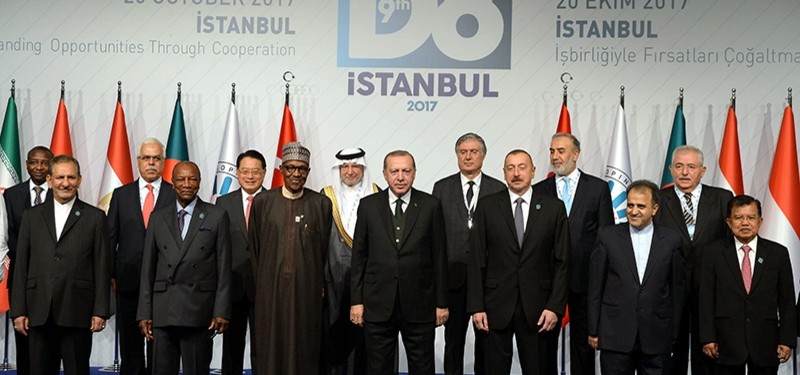
Turkey seeks trade in local currencies among D-8 states
President Recep Tayyip Erdoğan highlighted the importance of the use of national currencies in trade, noting that it will have positive repercussions for the economy.
- World
- Agencies and A News
- Published Date: 12:00 | 20 October 2017
- Modified Date: 03:23 | 20 October 2017
President Recep Tayyip Erdoğan on Friday called for trade with Developing-8 countries in local currencies as a way to ease pressure of exchange rates on member states.
Speaking at the D-8 Summit in Istanbul, Erdoğan said: "If we can pave the way for using our national currencies in trade among our countries, we will make a revolution in the D-8 history. There is no need to dissolve our economies under the pressure of exchange rate."
Turkey is hosting the summit this year under the theme 'Expanding Opportunities through Cooperation', taking over the charge from Pakistan.
Anadolu Agency is the official photographer at the event, marking 20 years of the eight-country alliance.
Nigerian President Muhammadu Buhari, Azerbaijani President Ilham Aliyev, Pakistani Prime Minister Shahid Khaqan Abbasi, Iranian First Vice President Eshaq Jahangiri and Indonesian Vice President Jusuf Kalla are at the summit.
Erdoğan urged the member states to bring together their central banks and establish a clearing house.
"We all have to embrace the D-8 and make efforts to increase its efficiency, productivity and strength," he added.
"We have the potential of wide-ranging cooperation in many fields; from good agricultural practices to clean energy, transportation to environment and education," he said.
The Turkish president also suggested the need to include new members in the organization.
"In a world, where everything changes, it is never acceptable that D-8 remains unchanged."
The D-8 was founded by former Turkish Prime Minister Necmettin Erbakan in 1997.
Formed as an economic alliance, the body consists of Bangladesh, Egypt, Indonesia, Iran, Malaysia, Nigeria, Pakistan and Turkey.
- VAST D-8 POTENTIAL
At present, the organization has a combined gross domestic product of $3.7 trillion and includes more than one billion people -- around 15 percent of the world's population.
Two of its members -- Turkey and Indonesia -- are among the world's 20 biggest economies.
In his remarks, Pakistani Prime Minister Shahid Khaqan Abbasi pointed out "the vast potential and resources" of D-8 countries.
"Realizing our combined potential and optimizing our collective resources requires cooperation and collaboration amongst us, at every level and every field," Abbasi said.
"I am certain that the organization will continue to move steadily along the path of even more robust economic cooperation," he said.
"It is also our sincere desire to see the D-8 enter the project-implementation phase with clear focus on the development, progress and prosperity of our peoples.
"We also aspire for it to have a stronger voice at the international level."
Referrring to the handing over of the D-8 presidency to Turkey, Pakistani premier said: "I am confident that your [Erdoğan] wisdom, sagacity, dynamism and firm commitment will bring new vigor to the D-8 Organization for Economic Cooperation."
In his closing remarks, Erdoğan said D-8 should be a platform for addressing the problems and conflicts that Muslims face.
Citing the example of the ongoing tragedy in Myanmar's Rakhine state, he said the organization should not stay silent over the situation of Rohinya Muslims.
The president said it was not right that the burden of helping Rohingya should only be placed on Bangladesh. "What is important here is how can we relieve Bangladesh?" Erdoğan said, calling on member states to alleviate the burden of Bangladesh.
Since Aug. 25, around 589,000 Rohingya have crossed into Bangladesh, according to the UN. The refugees are fleeing a military operation in which security forces and Buddhist mobs have killed men, women and children, looted homes and torched Rohingya villages.

